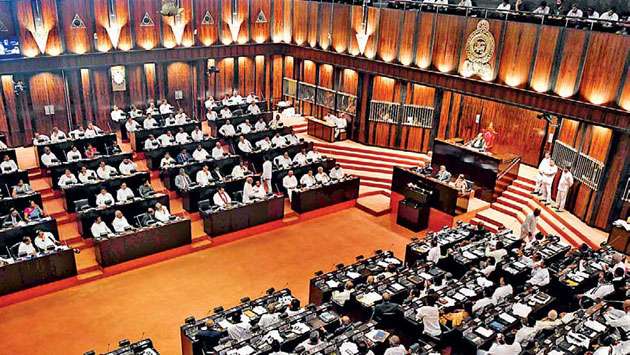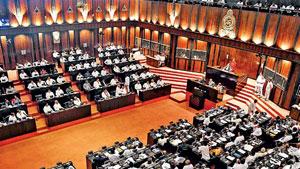Reply To:
Name - Reply Comment

 * Elusive promise made again ahead of presidential elections
* Elusive promise made again ahead of presidential elections
* It is nothing but a theatre of empty promises
The amendments to the existing Constitution or the creation of a new Constitution with a new one have always been key electoral topics starting from at least since 1994.
Still, nothing substantial has materialized since then despite attempts made on and off by the successive rulers.
It is easier said than done. First, in 1994, Ms. Chandrika Bandaranaike, the leader of the People’s Alliance(PA) which was the political amalgam led Sri Lanka Freedom Party (SLFP), secured power ending the 17-year rule of the United National Party (UNP). One main election pledge was the abolition of the executive presidency. In fact, JVP representative Nihal Galappatti who contested the presidential elections in 1994 withdrew from the race after he secured the promise from Ms. Kumaratunga to scrap the executive presidency. Executive presidential system is still in force even today after three decades.
After securing presidency for the second time, Ms. Kumaratunga introduced a new Constitution in 2000 providing for the abolition of the system for powers to be transferred to Parliament, but it could not be passed because her government and the then opposition UNP failed to see eye to eye.
The promises of constitution making or constitutional amendments are nothing new in Sri Lankan politics. Of course, they turn out to be mere vote catching gimmicks. Nevertheless, amendments have been incorporated into the Constitution in between. They ended up being ad hoc measures done without much though. An amendment incorporated by one government was undone by the other.
One example is the enactment of the 17th Amendment to the Constitution during the time of the probationary government between the People’s Alliance and the JVP. It provided for the establishment of the independent commissions. However, the spirit of the 17th Amendment was undone by the enactment of the 18th Amendment during the time of former President Mahinda Rajapaksa.
Again, the 19th Amendment was incorporated soon after the Yahapalana government was set up in 2015 virtually undoing the 18th Amendment. Interestingly, a large number of MPs who voted for the 18th Amendment also voted for the enactment of the 19th Amendment. It followed the enactments of the 20th and 21st Amendments.
The debate on constitution making, ahead of the presidential election, has again been sparked by the promise of the National People’s Power (NPP) to introduce a new Constitution in consensus with all the parties in case it secures power.
The introduction of a new Constitution has always been proven challenging and unrealistic according to the past experience. People interpret Sri Lanka as a country ethnically polarized. It is equally polarized on political lines. Consensus building for the required two-thirds had proven to be unrealistic in the past since the parties concerned stuck to their guns either for valid reasons or political ends.
At the 2020 general election, the Gotabaya Rajapaksa government obtained a two-thirds majority. His government initiated action for drafting a new Constitution. Despite having two-thirds in the House to get it passed, his government even failed to draft the new Constitution.
The NPP would have promised a new Constitution. As a party mature enough to understand parliamentary politics, the NPP or the JVP-led alliance is familiar with intricacies involved in consensus building. Still, it would have made such remarks targeting minority constituencies.
The party has made a major policy shift. It opposed tooth and nail to the 13th Amendment. Now it is for the implementation of it. Constitution making involves accommodation of minority rights making consensus building even more challenging.
Let alone, the introduction of a new Constitution, even the implementation of the provisions of the current Constitution - 13th Amendment- has proven to be a futile exercise. Talks about transferring land and police powers to the provincial councils have even become a political taboo.